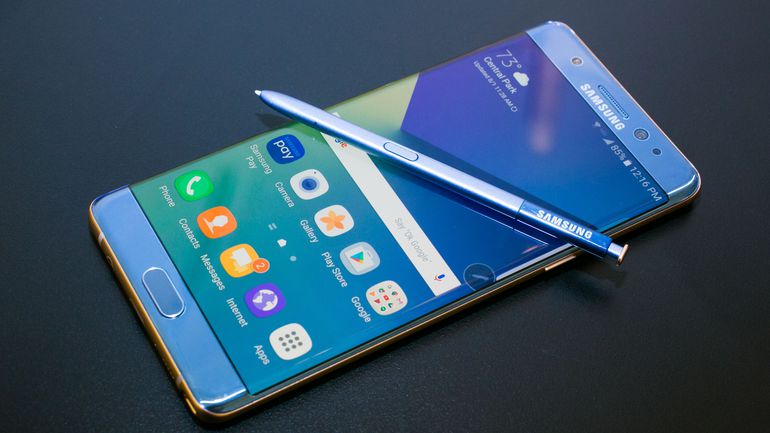- Samsung Woes Deepen Over Galaxy Note 7
Samsung Electronics took another hit Monday over its recalled Galaxy Note 7 smartphone, acknowledging it was “adjusting production” of the device after major distributors stopped offering replacements because of continued safety concerns.
The South Korean electronics giant has struggled in the wake of its September 2 decision to issue a global recall for 2.5 million Note 7s because of complaints that the lithium-ion battery exploded while charging.
Over the past week reports emerged of replacement units also catching fire, prompting US telecommunications firm AT&T and German rival T-Mobile to announce Sunday a halt to recall exchanges pending further investigations.
Their announcement prompted a steep dive in Samsung’s share price, which fell more than four percent at one point in morning trade. It recovered later to close the day at 1.68 million won ($1,515)– down 1.52 percent.
The market was also reacting to a South Korean media report that Samsung had temporarily shut down Note 7 production lines after discussions with consumer safety regulators from South Korea, the United States and China.
“We are in the process of adjusting production volumes,” Samsung said in a written response to the report.
The company said the move was “to enhance quality control and to enable thorough investigations following the recent cases of Galaxy Note 7 explosions”.
– Image problem –
With images of charred phones flooding social media, the unprecedented recall has proved a humiliation for a firm that prides itself as an icon of innovation and quality.
The recall process initially stumbled with some mixed messages, but seemed to be on track until last week when the reports of replacement phones catching fire began to emerge.
AT&T said it would still offer customers the option to exchange Galaxy Note 7s for another Samsung smartphone or other device of their choice, while T-Mobile said it was halting sales of the Note 7 as well as the exchanges.
“It’s all got very serious again,” said S.R. Kwon, an analyst at Dongbu Securities.
“They could just pull the Note 7 off the market, but the real concern is that it might not even end there,” Kwon said.
“It will damage Samsung’s brand image and also affect the sales of other Galaxy smartphones,” he added.
AT&T is the South Korean company’s third-biggest customer while T-Mobile’s parent is number four, according to estimates compiled by Bloomberg.
Bryan Ma, vice president of devices research for IDC, called the latest development “an ongoing nightmare”.
“The question is, if they switched the (battery) supplier, why is this problem still happening?” Ma told Bloomberg. “In other words, was it really a supplier issue or is there something else going on?”
– Management spotlight –
The trouble with the Note 7 and the handling of the recall, which analysts say could cost up to $2.0 billion, has shone a spotlight on Samsung’s management at a time when it is navigating a tricky generational power transfer within its founding Lee family.
Industry experts have criticised the Lee dynasty for controlling the vast group through a complex web of cross-shareholdings, even though they directly own only about five percent of total stocks.
And Samsung is also under pressure from one of its shareholders, the activist US hedge fund Elliott Management run by billionaire Paul Singer.
In a detailed proposal unveiled last week, Elliott laid out a strategy for streamlining Samsung, splitting the company in two, dual-listing the resulting operating company on a US exchange and paying shareholders a special dividend of 30 trillion won ($27 billion).
Elliott argued that Samsung, currently a maze of listed and unlisted companies with a notoriously opaque ownership and management structure, had suffered from a long-term undervaluation in the equity market.
Despite all its problems, Samsung on Friday issued a stronger-than-expected operating profit forecast for the third quarter, thanks largely to strong sales of memory chips and OLED display panels.
AFP


 Forex3 weeks ago
Forex3 weeks ago
 Naira3 weeks ago
Naira3 weeks ago
 Billionaire Watch3 weeks ago
Billionaire Watch3 weeks ago



 Naira3 weeks ago
Naira3 weeks ago






 Naira2 weeks ago
Naira2 weeks ago




 Naira2 weeks ago
Naira2 weeks ago




 Naira4 weeks ago
Naira4 weeks ago






 Naira1 week ago
Naira1 week ago























